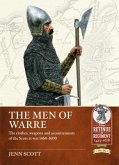The Elizabethan army has been disregarded, denigrated or derided: Shakespeare's portrayal of Falstaff and Fluellen bear more responsibility for this than any accurate assessment of its role in Elizabeth's reign. This book aims to provide a comprehensive explanation of the part that the English army, in its various guises, played in her long and increasingly troubled reign. Elizabeth was no Amazon Queen; she abhorred war because of its cost, its unpredictability and the inconstancy and insubordination of those she placed in charge. She could gain little personally from war as she was excluded from direct participation. Until 1585 she faced the problem of Queen Mary, a Catholic claimant to her throne whose existence threatened internal peace and greatly complicated matters abroad. Elizabeth was fearful of all her near neighbors as they could so easily unsettle her kingdom and her religious settlement. On her accession she tried to take advantage of crises in Scotland and France, and for the first time experienced the gap between what her military men would promise and what they could deliver. Determined as she was to maintain domestic peace, the Northern Rebellion of 1569 made it clear that England's military preparedness was wholly inadequate. Thus began a long project to make widespread military service managed by the government, especially as after 1585 more and more men were sent for service abroad. Ironically the Anglo-Spanish war was at least in part the consequence of Elizabeth's efforts to avoid this disastrous confrontation. Once committed she intervened either when England was directly threatened or when she was convinced that she could gain a significant strategic advantage. The many expeditions she facilitated were invariably badly managed and rarely achieved their potential. This book addresses the criticisms that she was inconsistent, mean and interfering and the cause of the many failures that overtook her armies. The book gives considerable space to the Nine Years' War in Ireland because it was of central importance to Elizabeth and the military establishment. It involved several key battles as well as developments in both strategy and tactics that have in the past been overlooked. Elizabeth's army played a vital part in defending the realm from foreign foes and domestic rebels, and although there was little glory it was a vital aspect of her reign and an important chapter in Britain's military history.
Bitte wählen Sie Ihr Anliegen aus.
Rechnungen
Retourenschein anfordern
Bestellstatus
Storno








